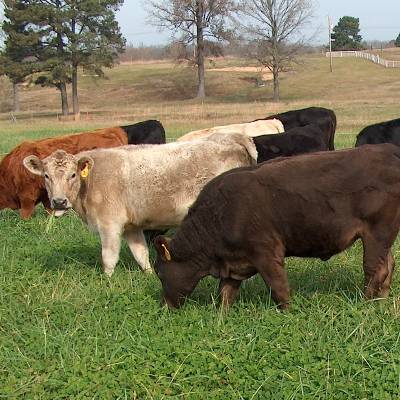Beef Cattle Health
For cattle to reach their performance potential, they must be healthy. A sound health program will vary from herd to herd. Particular diseases may be prevalent in one herd or area and be absent in another.

Partnering with a Veterinarian
The first rule to good herd health is disease prevention by developing a vaccine schedule with a veterinarian. Your veterinarian can also support your beef operation by performing diagnostic procedures, including necropsy and sample submissions to laboratories. To find a veterinarian that serves your area, refer to our Food Animal Veterinarian Directory.
Beyond Vaccines
Remember that a vaccination program alone shouldn't be considered your complete herd health program. Effective health management plan includes proper nutrition, parasite control and a biosecurity plan for your operation.
Biosecurity should be included in every herd health plan. To accomplish this, several general management practices could be implemented with minimal cost. Simple considerations include knowing what is in the area of your farm perimeter (e.g. farms, visitors, neighboring livestock and wildlife), individual animal identification, animal health protocols, recognizing and dealing with sick animals, supply handling and calf management.
Know the Dangers
Early identification of serious diseases can help minimize the risk of disease spread on your farm. If signs of disease are identified in an animal, seek veterinary services immediately. Waiting to treat the sick animal will only allow the spread of the infection to more animals on the operation. Signs of illness may include coughing, diarrhea, weight loss, runny eyes or nose, abortions, enlarged lymph nodes and lameness. If you come across a dead animal, consider having your veterinarian perform a necropsy to find out what caused the death.
Be Safe Not Sorry
Some diseases can be tested for before you purchase an animal, and disease testing is one way to eliminate the transfer of a disease to your herd. Livestock buyers should ask sellers to test animals prior to the sale exchange. However, the buyer needs to be aware that not all tests are 100 percent accurate. Ask your veterinarian which diseases he/she would recommend testing for before purchasing an animal. Newly acquired animals should be held in an isolated area for at least 3 weeks to insure that you do not introduce unwanted disease into your herd. Isolation includes no fence line contact, shared water source or feed bunk space with your main herd. Regularly observe the isolated animals closely for signs of disease.
By implementing a strong herd health program for your operation, disease risk can be minimized. For more information on disease risk management for your operation, visit your county Extension office.
Publications
- Herd health calendar (found in chapter 10)
- Livestock Health Series: Anaplasmosis
- Livestock Health Series: Bovine Respiratory Disease
- Livestock Health Series: Bovine Virus Diarrhea (BVD)
- Livestock Health Series: Calf Scours
- Livestock Health Series: Grass Tetany
- Livestock Health Series: Johne's Disease
- Livestock Health Series: Leptospirosis
- Livestock Health Series: Pinkeye
- Livestock Health Series: Reproductive Prolapses of Cattle
- Livestock Health Series: Trichomoniasis in Cattle
- Livestock Health Series: Vibriosis
- Prussic Acid
- Blackleg and Clostridial Diseases
- Common Arkansas Plants Poisonous to Cattle
- Internal Parasites in Beef and Dairy Cattle
- Nitrate Poisoning in Cattle
- Preconditioning Programs for Beef Calves